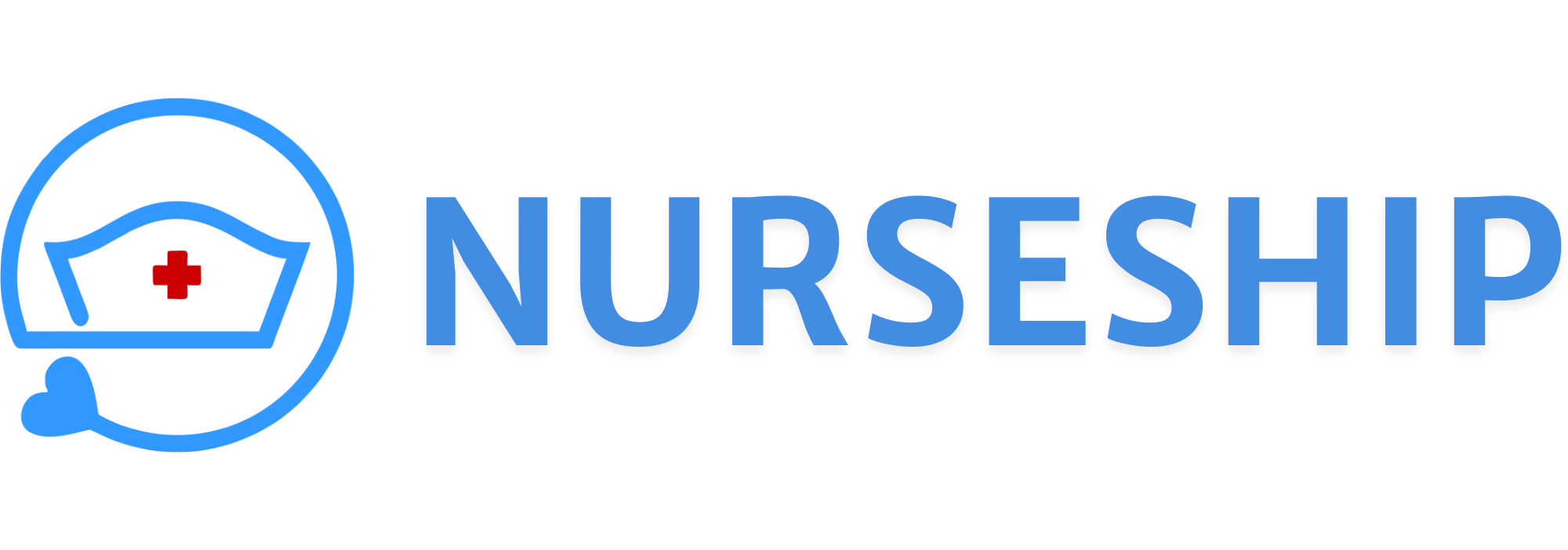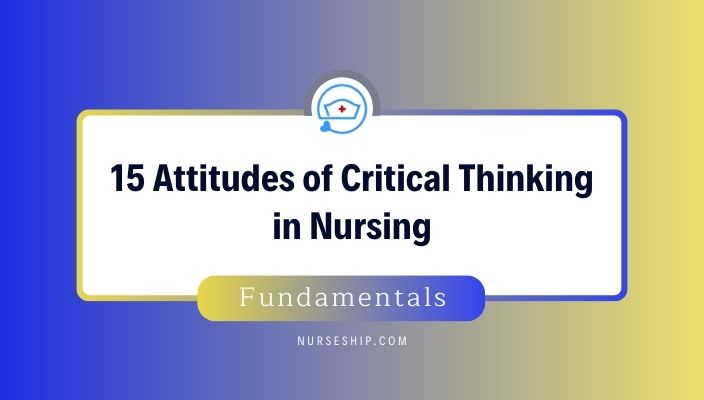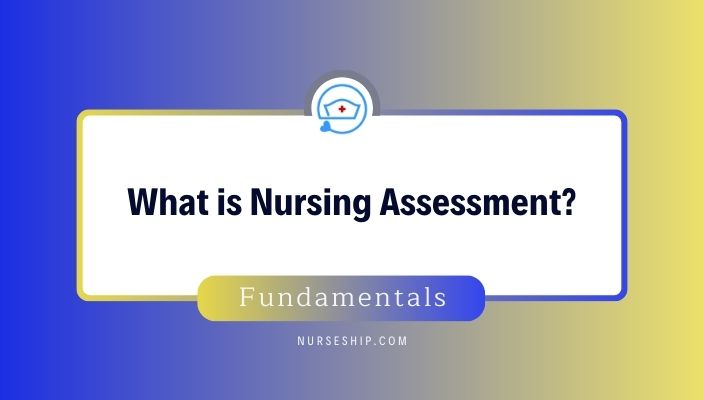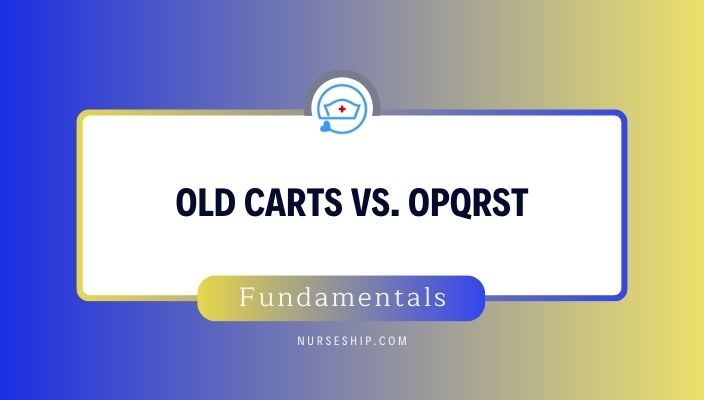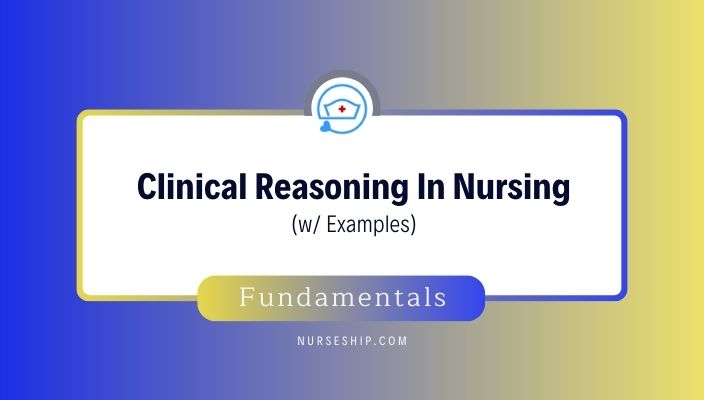Critical thinking is a powerful tool that nurses use to make informed decisions, provide top-notch care, and untangle complex problems.
Think of it as a toolbox filled with skills that let nurses dig deeper, understand better, and think smarter.
In this article, we’re going to explore the 15 super-important attitudes of critical thinking in nursing.
Each attitude is like a special key that helps nurses unlock the best care for their patients. Let’s dive in and learn about each attitude.
How To Improve Critical Thinking Skills In Nursing? 24 Strategies With Examples
15 Attitudes of Critical Thinking in Nursing
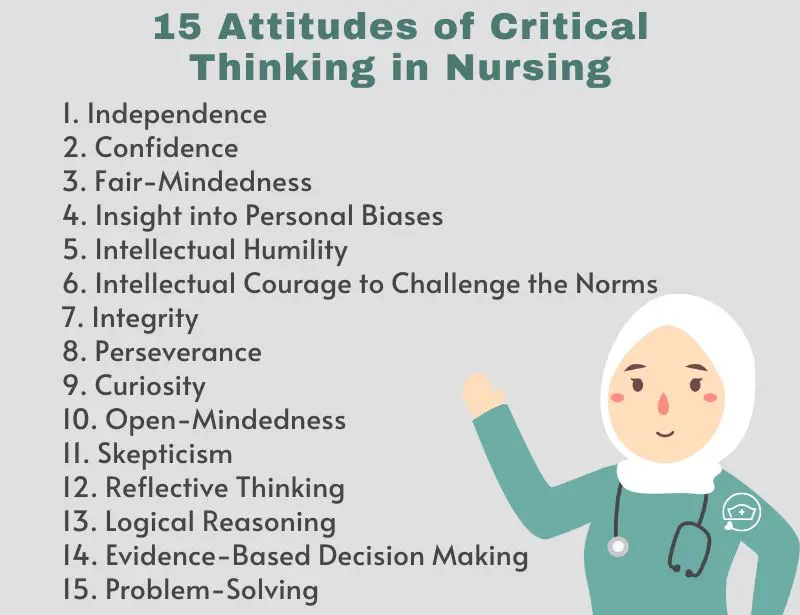
1. Independence
Independence is like thinking for yourself and making your own choices. Imagine you’re deciding what book to read, and you pick one that interests you, not just what others like – that’s being independent.
In nursing, independence means using your own judgment to provide the best care.
Example:
For, example, consider Rachel, a nurse, who considers various options to treat a patient’s pain, not just following what others do. Rachel’s independence helps her find solutions tailored to each patient’s needs.
Just like choosing your own book, independent nurses think critically and make decisions based on what’s best for their patients.
2. Confidence
Confidence is like believing in yourself and your abilities, even when faced with challenges. Imagine you’re trying a new activity, and you trust that you can learn and do well – that’s having confidence.
In nursing, confidence means having faith in your skills and judgment to provide excellent care.
Example:
For instance, think of Ava, a nurse, who remains composed when a patient’s condition suddenly worsens.
She knows she can handle the situation because of her training and experience. Ava’s confidence allows her to make quick and effective decisions during critical moments.
Just like trusting yourself in a new activity, confident nurses trust their expertise to deliver top-notch care to their patients.
3. Fair-Mindedness
Fair-mindedness is like treating everyone equally and making judgments based on facts, not personal feelings. Imagine you’re playing a game, and you give every player the same chance to win – that’s being fair-minded.
In nursing, fair-mindedness means being impartial and considering all viewpoints without bias.
Example:
For example, picture Liam, a nurse, who listens to both the patient and the family when making a decision about treatment.
He doesn’t let his own opinions influence his judgment. Liam’s fair-mindedness ensures that he provides balanced and patient-focused care.
Just like being fair in a game, fair-minded nurses make decisions that are just and unbiased, promoting the best outcomes for their patients.
4. Insight into Personal Biases
Insight into personal biases is like looking at yourself from the outside to see if your own feelings might affect your decisions. Imagine you have a favorite color, and you realize you tend to choose things in that color even if other options might be better – that’s being aware of your bias.
In nursing, insight into personal biases means being mindful of your own preferences and not letting them cloud your judgment.
Example:
For instance, think of Maya, a nurse, who knows she might prefer a particular treatment because it worked for her family member.
However, she steps back and considers what’s truly best for her patient’s situation. Maya’s insight helps her provide care that’s unbiased and patient-centered.
Just like being aware of your color preference, insight into personal biases helps nurses make decisions that are based on what’s right for their patients, not influenced by their own feelings.
5. Intellectual Humility
Intellectual humility is like knowing that you don’t have all the answers and being open to learning from others. Imagine you’re playing a video game, and you ask a friend for tips because they’re better at it – that’s being humble about your skills.
In nursing, intellectual humility means recognizing that you can always learn more and considering others’ expertise.
Example:
Picture James, a nurse, who seeks advice from experienced colleagues when faced with a complex case.
He knows that learning from others can lead to better patient care. James’s intellectual humility helps him grow as a nurse and keeps him open to new perspectives.
Just like seeking gaming tips, intellectual humility encourages nurses to value knowledge from various sources and continuously improve their practice.
6. Intellectual Courage to Challenge the Norms
Intellectual courage to challenge the norms is like having the bravery to question things that everyone believes are true. Imagine you’re playing a game with your friends, and everyone agrees on the rules – but you speak up and suggest a new way to play.
In nursing, intellectual courage means daring to question established practices and seeking innovative solutions.
Example:
For instance, think of Sarah, a nurse, who notices that a routine procedure might be improved for patient comfort.
Instead of staying silent, she speaks up and proposes a change, backed by research and careful thought. Sarah’s intellectual courage drives her to challenge the status quo for the sake of better patient care.
Just like suggesting a new game rule, nurses with this attitude challenge norms to advance healthcare practices and outcomes.
7. Integrity
Integrity is like being honest and doing the right thing, even when nobody’s watching. Imagine finding a lost wallet on the street – instead of keeping it, you return it to its owner because it’s the right thing to do.
In nursing, integrity means always acting ethically and responsibly, even in challenging situations.
Example:
Picture Emma, a nurse, who follows protocols and makes decisions based on what’s best for her patients, not personal gain.
Emma’s integrity shines when she prioritizes honesty, fairness, and patient well-being in every action she takes.
Just like returning that wallet, integrity is a nurse’s commitment to uphold high moral standards and maintain the trust placed in them by patients and their families.
8. Perseverance
Perseverance is like having a never-give-up attitude, even when things get tough. Imagine you’re trying to solve a challenging puzzle – even if it takes time and effort, you keep going until you find the solution.
In nursing, perseverance means facing obstacles and difficulties head-on without giving up.
Example:
For example, consider Mark, a nurse, who’s dealing with a complex patient case. Despite encountering roadblocks and uncertainties, Mark doesn’t lose hope.
He keeps researching, consulting colleagues, and trying different approaches until he finds the right solution for his patient.
Just like working through a tough puzzle, perseverance empowers nurses to keep pushing forward and find the answers that lead to the best care outcomes.
9. Curiosity
Curiosity is like having a hunger for knowledge that never goes away. Imagine you’re exploring a new place, and every corner seems to hide something interesting – you want to know what’s around the next bend.
In nursing, curiosity means having a strong desire to learn and discover.
Example:
Picture Anna, a nurse, who’s always asking questions like “Why?” and “How?” She’s not content with just knowing the basics; she wants to dive deeper and understand the “whys” behind patient conditions and treatments.
Anna’s curiosity drives her to stay updated with the latest research and innovative methods. Just like an explorer seeking new horizons, curious nurses seek new ways to provide better care for their patients.
10. Open-Mindedness
Open-mindedness is like having a door in your mind that’s always ready to welcome new ideas. Imagine you’re reading a book, and suddenly you come across a different way of thinking – instead of dismissing it, you consider it with interest.
In nursing, open-mindedness means being willing to listen to various viewpoints and explore different approaches.
Example:
For instance, think of Rachel, a nurse, who’s used to a specific way of treating wounds. But when a colleague suggests a new method, Rachel doesn’t shut the idea down.
Instead, she’s open to trying it out and seeing if it might work better for her patients. Just like being curious about new stories, open-minded nurses are curious about new ways to improve patient care.
11. Skepticism
Skepticism is like being a curious investigator who asks questions to make sure things are true. Imagine you hear about a magical potion that promises to make you fly – you might be skeptical and ask, “Is that really possible?”
In nursing, skepticism means not accepting things blindly but investigating to find the truth.
Example:
Picture Sarah, a nurse, who reads about a new treatment for pain relief. Instead of immediately believing it, she looks for evidence and checks if other experts agree.
Sarah’s skepticism helps her make sure that the treatments she uses are safe and effective for her patients.
Just like asking questions about that magical potion, nurses use skepticism to make informed decisions based on facts.
12. Reflective Thinking
Reflective thinking is like looking back at your day and thinking about what went well and what you could improve. Imagine you finished playing a game and you think about how you did – that’s reflective thinking!
In nursing, it’s when nurses take a moment to think about their actions, decisions, and interactions with patients.
Example:
For example, let’s say Jessica, a nurse, had a challenging day where she had to juggle multiple tasks. At the end of her shift, she takes a few minutes to reflect.
She thinks about what she did right, like comforting a worried patient, and what she could do better, like managing her time more efficiently.
This reflection helps Jessica learn from her experiences and become an even better nurse.
Just like looking in a mirror to see yourself, reflective thinking helps nurses see their actions and grow from them.
13. Logical Reasoning
Logical reasoning is like putting together the pieces of a puzzle to see the bigger picture. It’s about thinking step by step to reach a smart conclusion.
Imagine you have a math problem to solve. You start with the information you know and use logical steps to find the answer.
Similarly, nurses use logical reasoning to understand their patients’ situations
Example:
Let’s say Emily, a nurse, has a patient with a high fever and a sore throat. She gathers information about the symptoms, asks questions, and puts all the clues together.
By using logical steps, Emily figures out that the patient might have a throat infection and can recommend the right treatment.
Just like solving a puzzle, logical reasoning helps nurses connect the dots and make decisions that make sense for their patient’s health.
14. Evidence-Based Decision Making
Evidence-based decision-making is like being a detective who gathers clues before solving a mystery.
Example:
For instance, imagine Alex, a nurse, who wants to find the best way to help patients with diabetes manage their blood sugar levels.
Instead of guessing, he reads research studies and talks to experts in the field. Alex uses the facts he collects to choose treatments that are proven to work.
Just like a detective uses evidence to solve a case, Alex uses evidence to make informed decisions that lead to better patient outcomes.
15. Problem-Solving
Problem-solving is like being a detective on a mission. Think of it like when you have to figure out how to fix a broken toy.
Example:
For instance, Linda, a nurse, faces a challenge when a patient’s pain medication isn’t working well. Instead of giving up, she gathers information, talks to the patient, and works with the medical team to find a better solution.
Linda’s problem-solving skills help her piece together the right treatment plan, just like solving a tricky puzzle.
See Also:
- What is Critical Thinking in Nursing? (Explained W/ Examples)
- What is the “5 Whys” Technique?
- What Are Socratic Questions?
- Clinical Reasoning In Nursing (Explained W/ Example)
- 8 Stages Of The Clinical Reasoning Cycle
Conclusion
Critical thinking is a powerful tool that nurses use every day. These 15 attitudes are like a treasure map that guides nurses through the world of healthcare.
From being independent thinkers to having the courage to challenge norms, these attitudes help nurses provide the best care possible.
